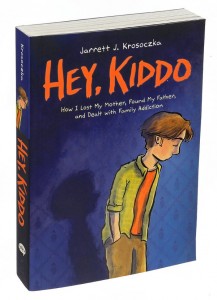 Bestselling author, Jarrett J. Krosoczka, wrote a piece recently for The Washington Post reflecting on the value of tough subjects in kids literature. CBLDF News Blog readers know that too often complex subject matters can lead to challenges and bans on great graphic novels and books that are well-reviewed, engaging to students, and educational, but the answer can’t be shying away from complex subject matters. As Krosoczka writes in his essay, “There are difficult truths in our books because there are difficult truths in children’s lives.”
Bestselling author, Jarrett J. Krosoczka, wrote a piece recently for The Washington Post reflecting on the value of tough subjects in kids literature. CBLDF News Blog readers know that too often complex subject matters can lead to challenges and bans on great graphic novels and books that are well-reviewed, engaging to students, and educational, but the answer can’t be shying away from complex subject matters. As Krosoczka writes in his essay, “There are difficult truths in our books because there are difficult truths in children’s lives.”
Krosoczka writes that when delving into his own past to write National Book Award finalist Hey, Kiddo he “needed to write openly and authentically so young people dealing with similar situations would feel less alone.” One of the tough issues of his childhood that he didn’t attempt to diminish was his mother’s opioid addiction. He writes, “to offer up a watered-down account of how addiction affected me a young person would have been disingenuous.”
There is nothing worse for a reader then encountering something familiar, especially something painful, and feeling the author is full of it. Fiction can feel true if the author deals with difficult topics in a way that rings true to the reader. And for a memoir like Hey, Kiddo (recommended to 12+ and up) at an age where young teens are eager to find fault with what adults tell them, it’s especially crucial to create that bond between author and reader that encourages sympathy or empathy, and trust in the narrative.
For too many children out there, the topics in Hey, Kiddo are difficult but also very familiar. Krosoczka uses data from National Surveys on Drug Use and Health estimating “8.7 million children ages 17 or younger in the United States who live in a household where at least one parent has a substance-use disorder — involving drugs, alcohol or both.” That’s less than one in 10, and a Harvard Study from 2016 estimated one in five children in the US live in a household where someone has a substance abuse problem.
Finding out that your children is reading a book that talks about opiates could be scary for parents who aren’t ready to have that conversation yet. But for a lot of children out there, it’s a conversation that will make them realize they aren’t alone. And that is critically important. A Psychology Today article about the Harvard study reported findings that “children whose parents use drugs and misuse alcohol are three times more likely to be physically, sexually, or emotionally abused and four times more likely to be neglected than their peers.” As Krosoczka writes, “Those young people deserve to be seen.”
And books like Hey, Kiddo are not only helping those children feel seen, but they are opening up dialogues that can increase understanding, empathy, awareness, and maybe even help break the cycle of multi-generational dependency.
Krosoczka goes on to write more specificually about handling the tough parts of his graphic memoir with his own daughter, and the essay is a wonderful read for parents and comic book lovers alike. But the critical part is that great works often deal with complex themes that parents want to believe are inappropriate for their children. But just because one parent’s child isn’t dealing with a difficult topic, doesn’t mean they don’t have friends and classmates who aren’t dealing with that topic. And it doesn’t mean that they don’t need coping strategies and open dialogues about that topic. This one essay talk about addiction, but chances are it could be applied to anything upsetting and statistics could be brought up to support the urgency of these conversations.
To paraphrase Krosoczka, there are tough subjects in great kids literature, because there are tough subjects in most kids lives. That’s the reason to read books and graphic novels that help make sense of complex situations, never a reason to challenge or ban them from public forums.
Help support CBLDF’s important First Amendment work by visiting the Rewards Zone, making a donation, or becoming a member of CBLDF!